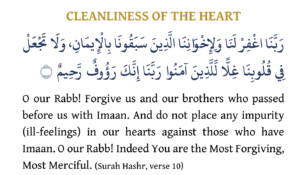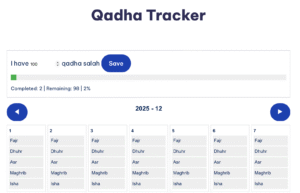How to say Astaghfirullah?
We frequently read the tasbih of Astaghfar. Generally we should read the full tasbih of Astaghfirullah which is
Ramadan Offer
أَسْتَغْفِرُ ٱللَّٰهَ رَبِّي وَأَتُوبُ إِلَيْهِ
“Astaghfiru Allah Rabbi wa atubu ilayhi.”
Translation : Verily, I seek the forgiveness of Allah, my Rabb and I turn to Him in repentance
It comes in a hadith that
مَنْ قَالَ أَسْتَغْفِرُ اللَّهَ الَّذِي لاَ إِلَهَ إِلاَّ هُوَ الْحَىُّ الْقَيُّومُ وَأَتُوبُ إِلَيْهِ غُفِرَ لَهُ وَإِنْ كَانَ فَرَّ مِنَ الزَّحْفِ ” .
Narrated Zayd, the client of the Prophet:
The Prophet (ﷺ) said: If anyone says: “I ask pardon of Allah than Whom there is no deity, the Living, the eternal, and I turn to Him in repentance,” he will be pardoned, even if he has fled in time of battle.
so another way we can read Astaghfirullah is this dua:
أَسْتَغْفِرُ اللَّهَ الَّذِي لاَ إِلَهَ إِلاَّ هُوَ الْحَىُّ الْقَيُّومُ وَأَتُوبُ إِلَيْهِ
Astaghfiru Allaha allathee la ilaha illa huwa alhayyu alqayyoomu wa atoobu ilayhi.”
“I ask pardon of Allah than Whom there is no deity, the Living, the eternal, and I turn to Him in repentance,”
How to say I seek refuge in Allah in Arabic
| Astaghfirullah pronunciation | astaġfiru -llāh |
| Astaghfirullah translation | I seek forgiveness from Allah. It is from root word غ-ف-ر, |
Narrated by Abu Huraira radi allahu anhu: Allah’s Messenger (peace be upon him) said, “When a servant acknowledges his sin and then repents to Allah, Allah accepts his repentance.” (Sunan Ibn Majah)
Astaghfirullah and Tawbah:
Astaghfirullah is intricately linked with Tawbah, the act of sincere repentance. While Astaghfirullah is the expression, Tawbah involves genuine remorse, intention to change, and restitution when possible.
When you say Astaghfirullah and you do tawbah, you should resolve
- To discontinue the sin
- To regret having committed it
- To resolve to never return to the sin
- To restore the rights of the person that has been wronged.
Sincere Repentance and faith in Allah’s Mercy can Overcome all barriers.We simply need to have faith in Our creator.
We should be constantly seeks pardon as a Muslim. This becomes the sabab of relief from every anxiety and provide sustenance.
There is a Story associated with this dua which is Very Inspiring.
The Story of Forgiveness : Story of Imam Ahmad and the Baker
This story about “Istighfar” is from the life of Imam Ahmed Bin Hanbal, who is considered as a renowned scholar of Islam and a famous theologian. Imam Ahmed is also considered to be the founder of the Hanbali school of fiqh (Islamic jurisprudence) and is one of the most celebrated Sunni theologians, often referred to as the “Sheikh ul-Islam” or the “Imam of Ahl al-Sunnah.”
During his old age, while Imam Ahmed was travelling he stopped by a town. After the prayers, he wanted to stay for the night in the masjid yard because he didn’t know anyone in the town. Owing to his humility, he hadn’t introduced himself to anyone thinking that if he did, he would be welcomed by many people.
Failing to recognize Ahmed bin Hanbal, the caretaker of the mosque refused to let him stay in the mosque. As Imam Ahmed was quite old, the caretaker had to drag him out of the mosque.
On seeing this, a baker from a nearby place felt pity for this man (Imam Ahmed) and offered to be the host to him for the night. During his stay with the baker, Imam Ahmed observed that the baker would constantly recite Istighfar (seek forgiveness from Allah).
Imam Ahmed asked the baker if the constant practice of saying Istighfar had any effect on him. The baker responded by telling Imam Ahmed that Allah had accepted all of his duas (supplications), except one. When he asked him what dua was it that hadn’t been accepted, the baker replied that he had been asking Allah to provide him the privilege to meet the famous scholar Imam Ahmed bin Hanbal.
On this, Imam Ahmed bin Hanbal said that Allah had not only listened to his dua but had dragged him onto his (the baker’s) doorsteps. (Read this story of Story of Imam Ahmed and the Baker in detail.
Astaghfirullah in Islam
The command to seek istighfar has been emphasised by all the prophets. because Istihjgar is a route of Pleasing Allah.
Allah says in Qur’an, Surah Hud, Verse 47:
وَقَالَ يَا قَوْمِ اسْتَغْفِرُوا رَبَّكُمْ ثُمَّ تُوبُوا إِلَيْهِ يُرْسِلِ السَّمَاء عَلَيْكُم مِّدْرَارًا وَيَزِدْكُمْ قُوَّةً إِلَىٰ قُوَّتِكُمْ وَلَا تَتَوَلَّوْا مُجْرِمِينَ
Translation: “And he said, ‘O my people, seek forgiveness of your Lord and then repent to Him. He will send [rain from] the sky upon you in showers and increase you in strength [added] to your strength. And do not turn away, [being] criminals.'”
In this verse, the Prophet Hud (peace be upon him) advises his people to seek forgiveness from Allah and turn to Him in repentance.
Astaghfirullah in Quran
Allah commands us to read Astaghfirullah, to do Istighfar of our sins.
Surah Muhammad, Verse 19:
فَاعْلَمْ أَنَّهُ لَا إِلَٰهَ إِلَّا اللَّهُ وَاسْتَغْفِرْ لِذَنبِكَ وَلِلْمُؤْمِنِينَ وَالْمُؤْمِنَاتِ وَاللَّهُ يَعْلَمُ مُتَقَلَّبَكُمْ وَمَثْوَاكُمْ
Translation: “So know, [O Muhammad], that there is no deity except Allah and ask forgiveness for your sin and for the believing men and believing women. And Allah knows of your movement and your resting place.”
Surah At-Tahrim, Verse 8:
يَا أَيُّهَا الَّذِينَ آمَنُوا تُوبُوا إِلَى اللَّهِ تَوْبَةً نَّصُوحًا عَسَىٰ رَبُّكُمْ أَن يُكَفِّرَ عَنكُمْ سَيِّئَاتِكُمْ وَيُدْخِلَكُمْ جَنَّاتٍ تَجْرِي مِن تَحْتِهَا الْأَنْهَارُ يَوْمَ لَا يُخْزِي اللَّهُ النَّبِيَّ وَالَّذِينَ آمَنُوا مَعَهُ نُورُهُمْ يَسْعَىٰ بَيْنَ أَيْدِيهِمْ وَبِأَيْمَانِهِمْ يَقُولُونَ رَبَّنَا أَتْمِمْ لَنَا نُورَنَا وَاغْفِرْ لَنَا إِنَّكَ عَلَىٰ كُلِّ شَيْءٍ قَدِيرٌ
Translation: “O you who have believed, repent to Allah with sincere repentance. Perhaps your Lord will remove from you your misdeeds and admit you into gardens beneath which rivers flow [on] the Day when Allah will not disgrace the Prophet and those who believed with him. Their light will proceed before them and on their right; they will say, ‘Our Lord, perfect for us our light and forgive us. Indeed, You are over all things competent.'”
Prophet Muhammad Sallalahu alaihe wa sallam used to read Astaghfirullah abundantly even though he was masum(innocent)
It comes in a hadith, that: “The Prophet sought the forgiveness (Istighfar) from Allah, more than seventy times a day.”(Sahih Bukhari Volume 8, Book 75, Number 39).Among the sunnah of the Prophet was that: “He never got up even from the smallest meeting without reciting Istighfar.”
Aishah (May Allah be pleased with her) reported: Prior to his demise, the Messenger of Allah (ﷺ) used to supplicate frequently: Subhan Allahi wa bihamdihi; Astaghfirullaha wa atubu ilaihi (Allah is free from imperfection, and I begin with praising Him. I beg forgiveness from Allah and I turn to Him in repentance.(Riyadh as saliheen, 1877)
Read – 3 Dua for Forgiveness and sayyedul Istighfar
Astaghfirullah hadiths
Narrated by Anas bin Malik: Allah’s Messenger (peace be upon him) said, “Allah is more pleased with the repentance of His slave than a person who has his camel in a waterless desert carrying his provision of food and drink and it is lost. He, having lost all hopes (to get that back), lies down in shade and is disappointed about his camel; when all of a sudden he finds that camel standing before him. He takes hold of its reins and then out of boundless joy blurts out, ‘O Allah, You are my slave and I am Your Lord!’ He commits this mistake out of extreme joy.” (Sahih al-Bukhari,Volume 8, Book 75, Number 321)
Narrated by Abu Huraira radi allahu anhu: Allah’s Messenger (peace be upon him) said, “When a servant acknowledges his sin and then repents to Allah, Allah accepts his repentance.” (Sunan Ibn Majah)
Benefits of Astaghfirullah
- It is following the sunnah of Rasul Allah sallalahu alaihe wa sallam
- Allah is pleased: Anas bin Malik Allah’s Apostle said,”Allah is more pleased with the repentance of His slave than anyone of you is pleased with finding his camel which he had lost in the desert.”
- Rizq is increased: The Prophet said: “Whoever makes Istighfar frequently, Allah will provide a way for him out of every distress and provide for him from sources he could never expect”
Hadith on doing astaghfar in Abu Dawud
- Sins are forgiven: Narrated Zayd, radi allahu anhu: The Prophet (ﷺ) said: If anyone says: “I ask pardon of Allah than Whom there is no deity, the Living, the eternal, and I turn to Him in repentance,” he will be pardoned, even if he has fled in time of battle.(Abu Dawud 1517)
Discover more from Islam Hashtag
Subscribe to get the latest posts sent to your email.







